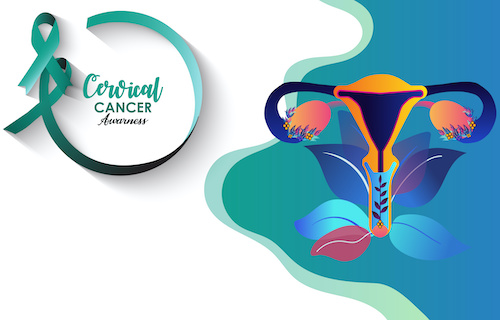
New Brunswick, N.J., January 1, 2022 - The American Cancer Society estimated 14,480 new cervical cancer diagnosed in the United States in 2021 with more than 4,000 deaths. Cervical cancer is the only gynecologic cancer that can be prevented—and there are numerous tools to promote prevention including vaccines and tested strategies.
James K. Aikins, Jr., MD, FACOG, FACS, is chief of Gynecologic Oncology at Rutgers Cancer Institute of New Jersey and manages the care of patients at this location and at Robert Wood Johnson University Hospital Hamilton, an RWJBarnabas Health facility. He is also an associate professor of Obstetrics, Gynecology and Reproductive Sciences at Rutgers Robert Wood Johnson Medical School and shares more information about cervical cancer prevention.
Primary Prevention with HPV Vaccines
Nearly all cervical cancer cases are due to a viral infection known as HPV (human papillomavirus). HPV will first cause pre-cancer cells and if left untreated can cause cervical cancer. An effective vaccine is available to prevent cancers caused by HPV infections. The Centers for Disease Control and Prevention recommends children receive two doses of the HPV vaccine at age 11 or12, although it can be started at age 9. The vaccine is approved to be administered until the age of 45 but it works better if received at an earlier age. Talk to your doctor to determine if the HPV vaccine is right for you or your child.
Routine Pap tests
Regular Pap tests and testing for HPV can detect precancerous changes that occur in cells and can eventually become cervical cancer. Women between the ages of 21 and 65 are typically screened, but the frequency varies depending on age and other factors.
Lifestyle Choices
Maintaining a healthy weight, being physically active and eating a healthy diet contribute to cancer prevention along with avoiding or quitting smoking. Additionally, there is no way of knowing whether a sexual partner is infected with HPV. The American Cancer Society reports that using condoms can reduce the rate of HPV infection by about 70 percent. All women should discuss a routine examination schedule with their doctor, as other factors may influence the frequency of a gynecologic exam, related tests and vaccines.
Learn more about the Gynecologic Oncology Program at Rutgers Cancer Institute of New Jersey, the state’s only National Cancer Institute (NCI) – designated Comprehensive Cancer Center together with RWJBarnabas Health.
For journalists – contact:
Krista Didzbalis
Media Relations Assistant
732-507-8307
krista.didzbalis@rutgers.edu
For patient appointments/inquiries – contact:
844-CANCERNJ (844-226-2376)

